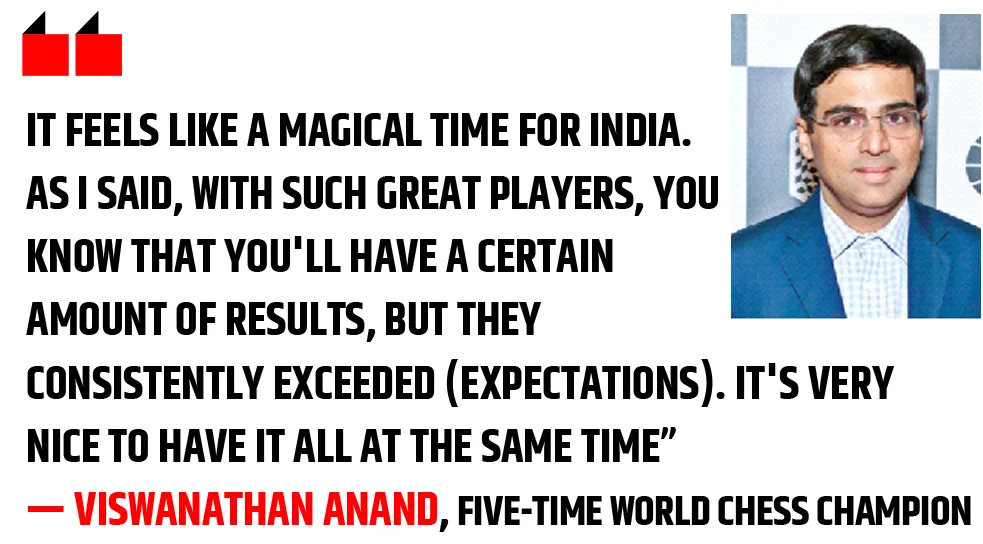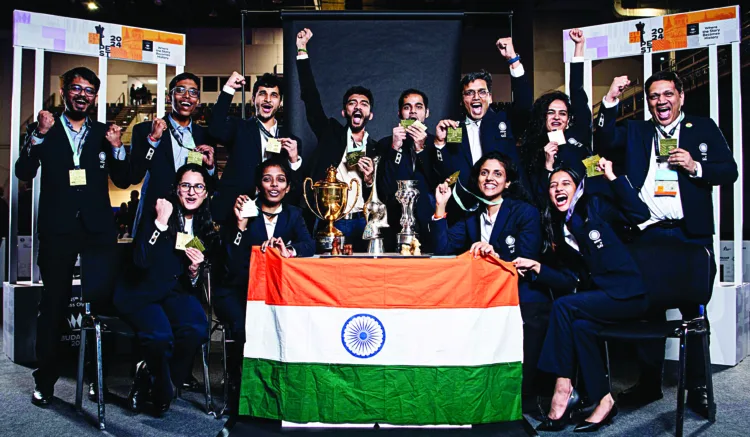Sir William Jones, a British philologist, orientalist and a puisne judge on the Supreme Court of Judicature at Fort William in Bengal, and a scholar of ancient India once said that “chess is one of the biggest gifts that India has bestowed upon the world”.
His statement was not mere rhetoric—it was an understanding of the game’s enduring legacy rooted in Indian history. His words echo through the centuries, as this strategic and intellectual game continues to captivate the minds of millions across the globe. Chess, which has its roots in India as ‘Chaturanga’(an ancient Indian strategy board game), was more than just a game—it was a symbol of analytical skills, and patience of the Indian civilisation.
Fast-forwarding to the modern times, India has not only sustained this legacy but also thrived on the global stage, marking its dominance in the world of chess.
India’s show of strength at Chess Olympiad
On September 22, 2024, India etched its name in history as both its men’s and women’s teams won their maiden gold medals at the 45th Chess Olympiad in Budapest. This remarkable achievement not only celebrates the present-day chess stalwarts but also serves as a testament to the centuries-old association India has had with the game.

From 7,752 games played by 1,870 players across 11 rounds over 13 days, India’s triumph is no small feat. After decades of Soviet dominance in the chess world, followed by Eastern Europe’s rise post-1960, the nerve centre of chess seems to have shifted. India and the Central Asian nations are now poised to challenge the traditional powerhouses, and Chess Olympiad 2024 was a great example of just that. Five Asian countries — India, Uzbekistan, China, Armenia, and Azerbaijan — secured spots in the top eight of the Open section. A similar pattern emerged in the women’s chess also, with the same teams (excluding Azerbaijan) claiming top-seven finishes, signalling that this is no coincidence but rather the rise of new chess powers.
The men’s team defeated Slovenia after D Gukesh, Arjun Erigaisi and R Praggnanadhaa won their respective matches in the 11th and final round match. The women’s team beat Azerbaijan 3.5-0.5 to clinch the title. Indian men had earlier won two bronze – in 2014 and 2022.
Modi’s guidance fuels Vantika’s victory
Prime Minister Narendra Modi hosted India’s young chess players at his official residence on September 25 to celebrate their remarkable achievement at the 45th Chess Olympiad in Budapest.
Vantika Agarwal, one of the Olympiad winners, recalled her story of meeting the then Gujarat Chief Minister Narendra Modi in 2012 and how his words left a deep impression on her. A photograph of the then nine-year-old Vantika with the Gujarat CM, accompanied by a note written by Vantika, has been doing rounds on social media in which she then wrote, “Thank you, sir, for motivating me to reach this height.”
Notably, during his tenure as Gujarat’s Chief Minister in 2009, he made chess a mandatory subject in schools in the Ahmedabad district, with plans to expand the initiative statewide. In 2012, to commemorate Swami Vivekananda’s 150th birth anniversary, Modi organised the ‘Swami Vivekananda Mahila Chess Mahotsav,’ aimed at breaking stereotypes. The tournament saw participation from over 3,500 women chess players, along with more than 1,250 Divyangjans.
World Championship challenger Gukesh and Arjun Erigaise yet again delivered in key games to help India secure its first title in the open category. Gukesh was at his very best in the technical phase of the game as black chess piece against Vladimir Fedoseev’s white. The 18-year-old Grandmaster was spot on with his tremendous strategic display.
Interestingly, Arjun also won with black on the third board against Jan Subeli out of a surprising Centre Counter defence game. Praggnanadhaa struck form and scored a crushing victory over Anton Demchenko, as India secured 3-0 triumph over Slovenia with one game remaining. The Indian men ended up with a remarkable 21 points out of a possible 22. They conceded just a lone 2-2 draw to Uzbekistan while beating the rest of the opponents. Gukesh, Arjun, Praggnanandhaa, Vidit Gujrathi and Pentala Harikrishna dominated the proceedings, winning 10 of its 11 rounds while sharing the spoils only once — against defending champion Uzbekistan in the third-last round.
While Gukesh and Arjun led the charge for the men’s team, winning eight and nine games respectively to claim individual gold medals, it was Divya Deshmukh and Vantika Agrawal on the bottom two boards of the women’s team who did the heavy lifting, ensuring India’s double delight in both sections. The duo accounted for 14 of the team’s total 23 wins, earning individual gold medals on Boards 3 and 4.
The Indian women also gave a rare double gold for the country as they scored 3.5-0.5 victory against Azerbaijan. D Harika was at her technical best, striking on the top board for the team. After R Vaishali drew her game, the Indian team emerged victorious with Vantika Agrawal scoring another brilliant triumph. What makes this triumph even more remarkable is the youth of the Indian contingent — six out of 10 players are under 23, with an average age of less than 20 among the four individual gold medallists.
The success of modern Indian chess players is not merely the result of individual brilliance but is a continuation of ancient tradition. Ancient epics like the Mahabharat often depict games of strategy and mental prowess, a reflection of how deeply embedded such activities are in Indian thought.
Nurturing talent in Digital Age
What is especially fascinating about India’s rise in the chess world today is the environment in which modern players are being nurtured. The digital age has revolutionised the way chess is taught and played. Online chess platforms and advanced AI tools have provided young Indian talents with unprecedented access to global resources and competitions.
The future of Chess in India
What began as a game of kings has now become a game of the masses. Young children across India are taking up chess at an early age, inspired by their heroes. India’s success at the Chess Olympiad is not the end of its journey; it is the beginning of a new chapter. With the foundation laid by legends like Viswanathan Anand and the present-day achievements of young stars like Gukesh, Praggnanandhaa, Divya, Vaishali and many more, India is poised to dominate the world of chess for years to come.


















Comments